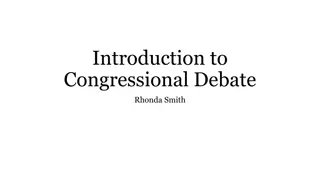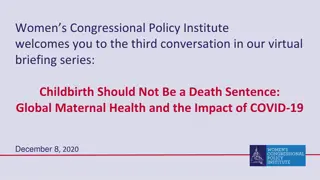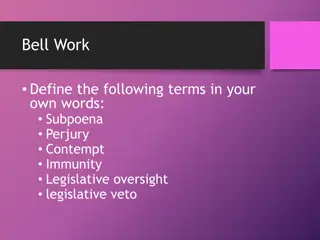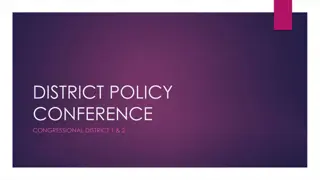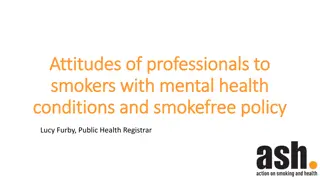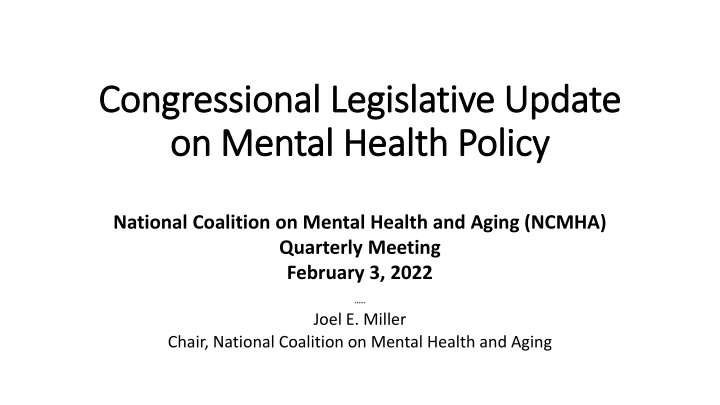
Congressional Legislative Update on Mental Health Policy & Initiatives
National Coalition on Mental Health and Aging (NCMHA) provided recommendations to the Senate Finance Committee regarding mental health legislative initiatives. The Senate Health, Education, Labor, and Pensions Committee (HELP) held a hearing on mental health and substance use disorders, focusing on workforce gaps and suicide prevention efforts. The House Ways and Means Committee addressed the lack of coverage for evidence-based substance use disorder treatment under Medicare. The House passed mental health bills in 2021 awaiting Senate action.
Download Presentation

Please find below an Image/Link to download the presentation.
The content on the website is provided AS IS for your information and personal use only. It may not be sold, licensed, or shared on other websites without obtaining consent from the author. If you encounter any issues during the download, it is possible that the publisher has removed the file from their server.
You are allowed to download the files provided on this website for personal or commercial use, subject to the condition that they are used lawfully. All files are the property of their respective owners.
The content on the website is provided AS IS for your information and personal use only. It may not be sold, licensed, or shared on other websites without obtaining consent from the author.
E N D
Presentation Transcript
Congressional Legislative Update Congressional Legislative Update on Mental Health Policy on Mental Health Policy National Coalition on Mental Health and Aging (NCMHA) Quarterly Meeting February 3, 2022 ***** Joel E. Miller Chair, National Coalition on Mental Health and Aging
Senate Finance Committee Senate Finance Committee Solicited Information in November on Mental Health Legislative Initiatives NCMHA Submitted Recommendations Issue Areas and Work Group Co-Chairs -- Strengthening the Workforce: Stabenow/Daines -- Increasing Integration, Coordination and Access to Care: Cortez- Masto/Cornyn -- Ensuring Parity between Behavioral & Physical Health Care: Bennet/Portman -- Furthering the Use of Telehealth: Cardin/Thune -- Improving Access to Behavioral Health Care for Children and Young People: Carper/Cassidy
Senate Health, Education, Labor, and Pensions Senate Health, Education, Labor, and Pensions Committee (HELP) Committee Committee (HELP) Committee FEBRUARY 1STHEARING Mental Health and Substance Use Disorders: Responding to the Growing Crisis Focus of the hearing was substance use/addiction challenges and Congressional funding initiatives to address problems. Chairman Murray and some of the witnesses stressed workforce gaps and suicide prevention efforts in opening remarks. Co-occurring disorders not adequately coordinated across systems. Need to reauthorize key programs like Minority Fellowship Program.
House Ways and Means Committee Held a Hearing on America's Mental Health Crisis , February 2, 2022 Medicare Does Not Cover the American Society of Addiction Medicine Continuum of Evidence- Based Substance Use Disorder Treatment. A Vast Portion of the Substance Use Disorder Provider Workforce is Not Authorized to Deliver Services under Medicare. Community-Based Settings of Substance Use Disorder Treatment Are Not Covered Under Medicare. Medicare s Lack of Parity Creates Discriminatory Barriers to Care Based on Inequitable Reimbursement Rate Setting and Medicare Advantage Utilization Management and Network Adequacy Practices. Adoption of Strong Quantitative Metrics and Enforcement Standards Will Improve Access to Affordable Mental Health and Substance Use Disorder Care in Qualified Health Plans and Employer Sponsored Plans. Protect Consumers from Unaffordable Out-of-Pocket Cost When Networks Fail to Offer Adequate Networks of Mental Health and Substance Use Disorder Providers.
House House- -Passed Mental Health Bills in 2021 Awaiting Passed Mental Health Bills in 2021 Awaiting Senate Action (HELP Committee) Senate Action (HELP Committee) Pursuing Equity in Mental Health Act (S. 1795/H.R. 1475) Introduced by Sens. Menendez (D-NJ), Cortez Masto (D-NV), and Booker (D-NJ) and Reps. Watson Coleman (D-NJ) and Katko (R-NY) STANDUPAct (S. 1543/H.R. 586) Introduced by Sens. Hassan (D-NH) and Ernst (R-IA) and Reps. Peters (D-CA) and Bilirakis (R-FL) -- S. 1543 passed the Senate on December 14, 2021 Mental Health Services for Students Act (S. 1841/H.R. 721) Introduced by Sen. Smith (D-MN) and Reps. Napolitano (D- CA) and Katko (R-NY) Effective Suicide Screening and Assessment in the Emergency Department Act (S. 467/H.R. 1324) Introduced by Sens. Murkowski (R-AK) and King (I-ME) and Reps. Bilirakis (R-FL) and Soto (D-FL) Improving Mental Health Access from the Emergency Department Act (S. 2157/H.R. 1205) Introduced by Sens. Moore Capito (R-WV) and Hassan (D-NH) and Rep. Ruiz (D CA) HERO Act (S. 2700/H.R. 1480) Introduced by Sens. Rosen (D-NV) and Fischer (R-NE) and Reps. Bera (D-CA) and Fitzpatrick (R-PA) Suicide Prevention Lifeline Improvement Act (S. 2425/H.R. 2981) Introduced by Sen. Reed (D-RI) and Reps. Katko (R- NY), Beyer (D-VA), and Napolitano (D-CA) -- S. 2425 was placed on the Senate Calendar on September 21, 2021 Campaign to Prevent Suicide Act (H.R. 2862) Introduced by Reps. Beyer (D-VA) and Kinzinger (R-IL) Suicide Prevention Act (H.R. 2955) Introduced by Reps. Stewart (R-UT) and Matsui (D CA)
Mental Health Funding in Federal Budget Mental Health Funding in Federal Budget Late last year, the House and Senate Labor-HHS Subcommittees proposed and approved significant funding levels for mental health, substance use treatment, suicide prevention and recovery services. Congress needs to codify those funding levels into the final FY2022 annual appropriations package (final Budget), providing the needed and long-term investments to transform how our country responds to people in need. A continuing resolution of any length threatens our ability to meet the growing demand for lifesaving mental health and substance use prevention, treatment and recovery services. Need to prioritize funding for critical mental health and substance use prevention, treatment, and recovery programs through a final 2021-22 Final Federal Budget.
The 2022 National Defense Authorization Act (NDAA) and Mental Health Programs Congress authorizes annually, through the National Defense Authorization Act (NDAA), mental health programs and services within the Department of Defense that support service members, military retirees, and their families. Eating Disorders Act will require DOD to periodically screen for, and treat, eating disorders among service members. Provision would also require the TRICARE program to cover certain outpatient & inpatient treatment services (e.g., residential services/partial hospitalization programs) for eating disorders among service members & their dependents. Mental Health Evaluations Act will require DOD to establish a new process that triggers a command-directed mental health evaluation. The new process would allow a service member to disclose a certain phrase that then initiates an automatic, confidential referral for a mental health evaluation. Scheduling Appointments Will require DOD to conduct a one-year pilot program that provides direct assistance to beneficiaries scheduling mental health appointments at certain military treatment facilities. Suicide Prevention Will require the Secretary of Defense to establish an independent committee to conduct a review of DOD s suicide prevention and response programs, factors that contribute to military suicides, and provide an initial and final report to Congress on their findings.
U.S. Depts of Labor, HHS, & Treasury Issue 2022 Mental Health Parity & Addiction Equity Act Report to Congress Report shows failures to deliver parity in mental health, substance-use disorder benefits The report includes information that suggests health plans and health insurance issuers are failing to deliver parity for mental health and substance-use disorder benefits to those they cover. The report also highlights the departments' recent emphasis on greater MHPAEA enforcement in addition to guidance to correct those failures, and makes recommendations to strengthen MHPAEA's consumer protections and enhance the departments' enforce abilities. The report cites specific examples of health plans and health insurance issuers failing to ensure parity. For example, a health insurance issuer covered nutritional counseling for medical conditions like diabetes, but not for mental health conditions such as anorexia nervosa, bulimia nervosa and binge-eating disorder. "The report's findings clearly indicate that health plans and insurance companies are falling short of providing parity in mental health and substance-use disorder benefits, at a time when those benefits are needed like never before," said U.S. Secretary of Labor Marty Walsh.
Drug Overdose Deaths Drug Overdose Deaths An estimated 100,000 Americans died of drug overdoses last year, a never-before-seen milestone that health officials say is tied to the COVID-19 pandemic and a more dangerous drug supply. Overdose deaths have been rising for more than two decades, accelerated in the past two years and, according to new data, jumped nearly 30% in the latest year. Experts believe the top drivers of overdose deaths are the growing prevalence of deadly fentanyl in the illicit drug supply and the COVID-19 pandemic, which left many drug users socially isolated and unable to get treatment or other support. Read more here https://apnews.com/article/overdodse-deaths-fentanayl-health- f34b022d75a1eb9776e27903ab40670f
HHS Overdose Prevention Strategy HHS Overdose Prevention Strategy Recognizing the need to address the drug overdose crisis holistically across the continuum of substances, prevention, and services and to meet the needs of people who misuse drugs and their communities, the US Department of Health and Human Services (HHS) developed a novel Overdose Prevention Strategy (Strategy) for the Biden administration. Agencies across HHS came together in a collaborative effort around evidence- based activities in four priority areas: primary prevention, harm reduction, evidence-based treatment, and recovery support. The Strategy consists of more than 40 public-facing high-impact activities recently launched or underway around substance use disorders (SUD) and overdose, representing the backbone of the many complementary initiatives ongoing in HHS.
BEHAVIORAL HEALTH AND COVID-19 Higher-Risk Populations and Related Federal Relief Funding: Report to Congressional Committees The U.S. Government Accountability Office (GAO) a federal watchdog agency released a comprehensive study in December highlighting that the Covid-19 pandemic has had repercussions for the behavioral health of the nation especially for high-risk populations. Certain racial and ethnic groups such as Native Americans who were hospitalized at a rate 3.5 times greater than that of White people; & Blacks and Latinos who were hospitalized 2.8 times more. Health care workers who fear catching Covid-19, worry about giving it to family members and suffer from exhaustion, burnout, and the emotional toll of watching people die. Children whose school closures produced stress and limited access to behavioral health screening, while keeping them at home with adults whose Covid-19 experiences could lead to negative consequences in the home, such as substance abuse. Young adults whose craving for socializing has been thwarted by the pandemic. People with pre-existing behavioral health issues whose conditions could worsen with isolation, unemployment and an inability to connect with treatment. People in financial distress whose regular problems, including difficulty affording food, housing and transportation, are exacerbated by the fear of Covid-19.
GAO Report, cont. GAO Report, cont. Other populations that the GAO identified as potentially being at higher risk of behavioral health effects related to the COVID-19 pandemic include: Older adults -- such as those with cognitive impairments or who live in a nursing home. Stakeholders interviewed said that social isolation and lack of social supports could be contributing to poor behavioral health effects in this population. People with fewer social supports -- are particularly at risk, with some citing the potential impact of pandemic-driven social isolation. Unpaid caregivers of adults -- self-reported unpaid caregivers of adults have reported higher rates of increased substance use to cope with pandemic-related stress, suicidal ideation, and symptoms of anxiety disorder or depressive disorder than people who were not unpaid caregivers.
Commonwealth Fund Study on Older Adult Commonwealth Fund Study on Older Adult Mental Health Mental Health KEY TAKEAWAYS FROM "COMMONWEALTH FUND" STUDY: U.S. Medicare beneficiaries have one of the highest rates of mental health needs overall. Even so, they are more likely to skip, or delay, needed care because of costs than older adults in any other of the high-income countries. Within the Medicare population, beneficiaries with mental health needs are more likely to skip care compared to those without mental health needs. The study highlighted that despite the high need for mental health care services by older adults in the U.S., the supply of mental health providers is low. https://www.commonwealthfund.org/publications/issue-briefs/2022/jan/comparing- older-adults-mental-health-needs-and-access-treatment The Commonwealth Fund regularly issues studies and briefs on an array of health care issues related to cost, access, coverage, and quality of care.
Impact of Pandemic on Health Care Workers Impact of Pandemic on Health Care Workers A survey of more than 500 health care workers and first responders published this week in the Journal of General Internal Medicine, co-authored by two of us (R.H. and K.H.), found that a substantial majority of respondents reported experiencing clinically significant psychiatric symptoms, including post-traumatic stress disorder (38%), depression (74%), anxiety (75%), and recent thoughts of suicide or self-harm (15%). Read more here https://www.statnews.com/2021/12/16/health-care- workers-suffering-goes-far-beyond-burnout-self-care-isnt-the-cure/ Months after a bout with COVID-19, many people are still struggling with memory problems, mental fog and mood changes. One reason is that the disease can cause long-term harm to the brain. A recent study found that more than 13% of hospitalized COVID-19 patients had developed a new neurological disorder soon after being infected. A follow-up study found that six months later, about half of the patients in that group who survived were still experiencing cognitive problems. Read more here https://www.npr.org/sections/health-shots/2021/12/16/1064594686/how-covid-threatens-the- brain
Dementia and Cataracts Dementia and Cataracts Older people who have cataracts removed may be gaining more than better vision. Research published in JAMA Internal Medicine suggests that they are nearly 30 percent less likely to develop dementia, including Alzheimer s disease, than are people with cataracts who do not have the surgery. Read more here https://www.washingtonpost.com/health/cataracts-vision- dementia/2022/01/07/baa0ceba-6d79-11ec-a5d2-7712163262f0_story.html
Thank You and Questions Thank You and Questions joel.miller44@yahoo.com joel.miller44@yahoo.com 703 703- -868 868- -4407 4407




